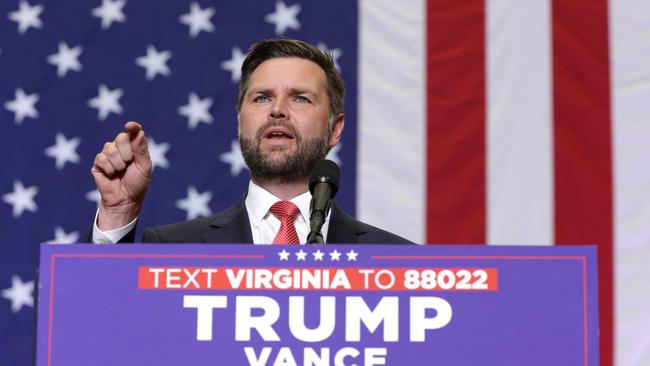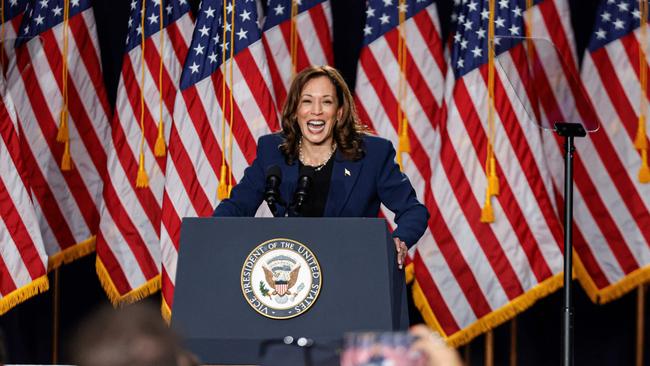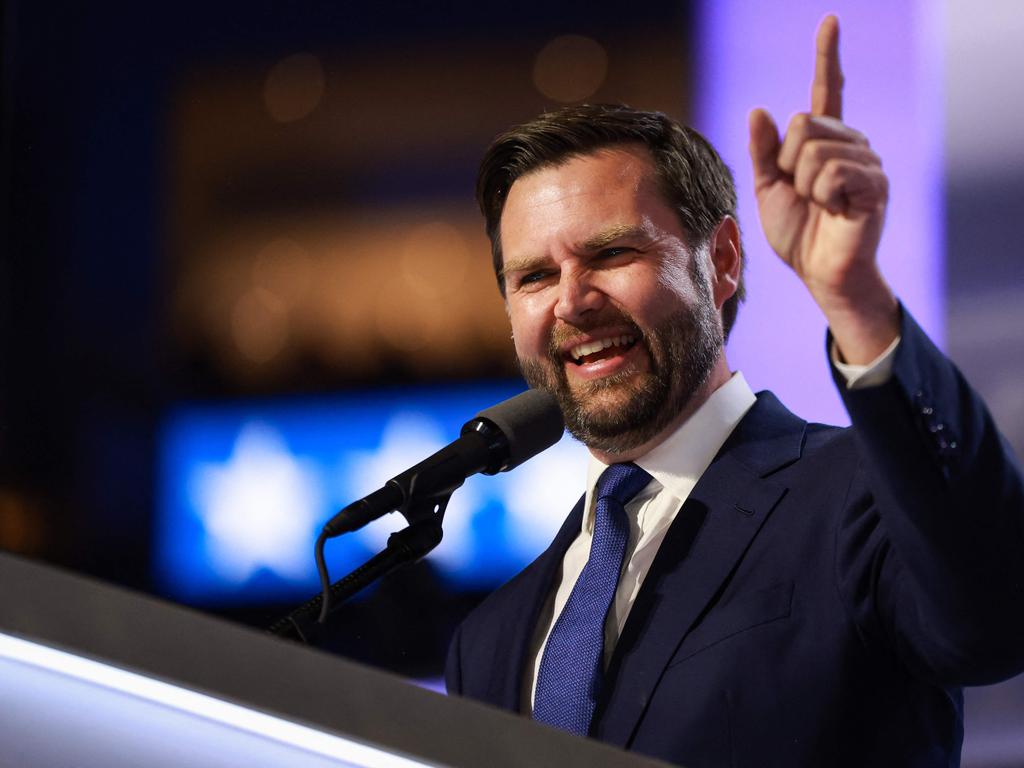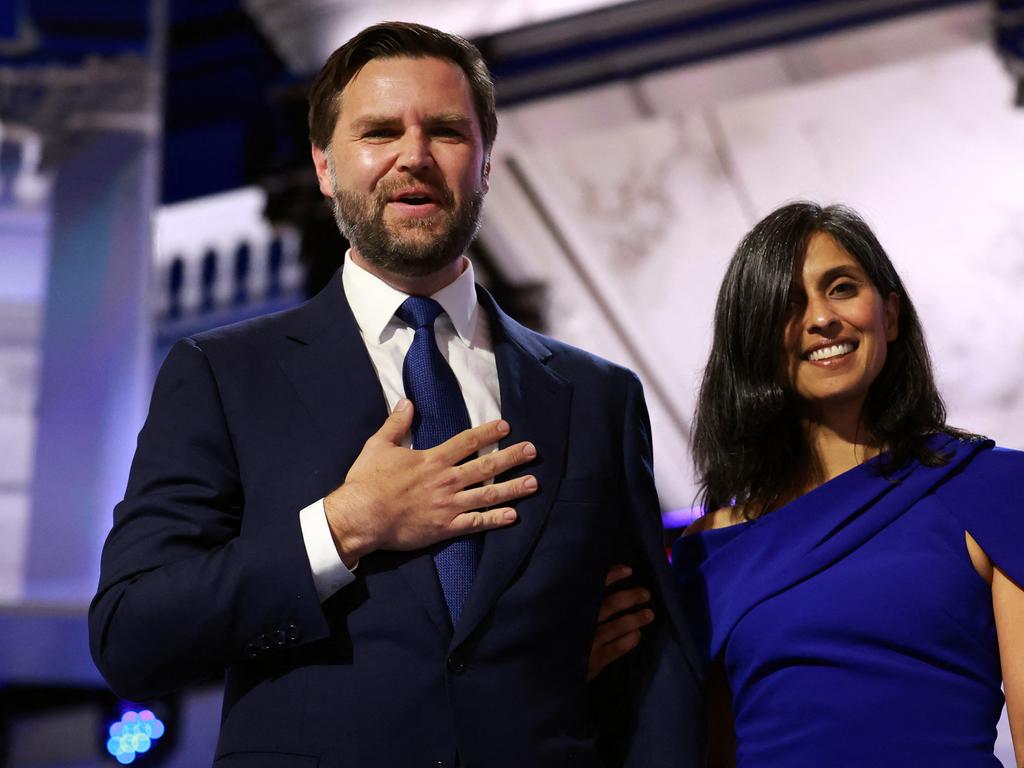
At one level it’s the ever-greener left versus a much less pro-business conservatism. At a deeper level, though, it’s the politics of identity versus the politics of opportunity: a candidate picked because she ticked all the right boxes versus a candidate who has overcome crippling disadvantages to become the likely inheritor of a political insurgency fighting against the decadence of these times.
Kamala Harris was never on the Biden ticket because of her political achievements or even her political potential. As an old white male, but as the only electable senior Democrat, Biden needed a running mate who would satisfy the climate and identity obsessives who predominate among the Democratic Party’s activists. Enter Harris: the US-born child of an Indian medical researcher and a Jamaican academic (so not an African-American, yet a fact often fudged to chase the black vote).
Her parents’ divorce gave her an acceptably underprivileged upbringing, but it was her connections (and partners) that gave her a ready glide path to university, public legal work and the Democratic Party patronage machine.

She was an elected district attorney in San Francisco, then an elected attorney-general for California – a highly political one and selectively tough on crime – before jagging a Senate seat in 2016. After dropping out of the 2020 presidential primaries because of a garbled message and a shambolic campaign, she became the perfect intersectional foil for Biden, not just ticking two identity boxes as a woman and a candidate of colour but as someone who could be relied on not to upstage her boss.
As the incumbent Vice-President to a visibly failing President, she’s now the Being There candidate for a party that could not jettison an incumbent woman of colour for a candidate with a much better chance of being an effective leader of the free world.
As Vice-President, her only real job was managing the human waves across the southern border triggered by Biden’s “I am not building a wall” election. With some 11 million undocumented foreigners entering the US since 2020, in this respect she has been a manifest failure.
Otherwise, she has been more strident than her boss on climate and identity issues, weaker on China, Ukraine and Israel, and even blander – although sometimes marginally more coherent – in her public utterances.
And the same people who were previously briefing that Biden had to stay because Harris was unqualified for the world’s biggest job are now insisting that she has given the Democrats new hope of victory.
While it’s true that relatively undistinguished subordinates can shine when given authority, there’s nothing in Harris’s past to suggest that she could ever be more than a politically correct functionary.
She epitomises modern politics’ dispiriting tendency to produce officeholders who reflect the times rather than improve them.
Still, on the back of Trump’s weaknesses – his character flaws, his arrogance and now his age – it’s quite possible that she could win and it would be a mistake to underestimate her, especially if the Democrats can maintain the pretence of her competence as well as they did with Biden.
In calling for Biden to leave the presidency and thus elevate Harris, Republicans should be careful what they wish for because the power of incumbency would give her an enormous platform. Tragics like us who follow politics know her record and lack of competence, but to most Americans she is a blank page – and being able to write on that page from the Oval Office before November would be an opportunity the Democrats could well exploit.

By contrast, Vance is the genuine “log cabin to White House” article. He grew up dirt poor in hard-scrabble Appalachia, mostly raised by his grandmother because of the addictions that his mother has now finally overcome. He has lived the reality of small-town, rust-belt America, where well-paid blue collar jobs have largely disappeared overseas thanks to a globalisation (and equalisation) that has been much better for America’s economic rivals and strategic competitors than for the country whose armed forces and former intellectual self-confidence made globalisation possible.
As his Hillbilly Elegy memoir shows, despite growing up amid low expectations, widespread hopelessness and chronic bad choices, Vance somehow kept his self-belief and belief in America, joining the marines after 9/11, serving in Iraq, attending Yale law school before becoming a venture capitalist and then senator. In earlier times, when the left-of-centre working-class party still had a “faith, flag and family” wing, he might even have been a Democrat.
As a kid from the white underclass who resisted the lure of drugs, the scourge of welfare, the tyranny of low expectations and the general culture of individual and collective self-loathing, Vance exemplifies a less patrician, less establishmentarian conservatism that, if coupled with governmental competence, might readily turn out to be more compelling to voters than the somewhat bloodless managerialism recently on display from most Anglosphere centre-right parties.
At least potentially, he’s a more attractive political personality than Trump, a millionaire’s son who became a crony capitalist and reality TV star; understanding that the swing-state voters that Republicans need to win are more likely to see Vance as one of them than Trump. And the same too when it comes to Harris, which makes her pick of running mate critically important.
The conservatism of Margaret Thatcher and Ronald Reagan was never mainly about creating market freedoms, boosting business and exalting the individual – and to the extent that it was, these were means to making countries stronger, governments better and communities more prosperous.
Real conservatism has always been about respect for everything that makes us human: our families, our neighbourhoods and our countries – and it’s these existential attachments that feed the “make America great again” passion that Trump is harnessing.
This is where Vance, who could so easily have fallen into victimhood, is potentially far more totemic than Trump himself, because his life testifies that America can still be the land of the free and the home of the brave.
And as for the policies that Trump and Vance are enunciating, it’s an entirely conservative instinct to want to control the borders and maintain the character of the country. It’s perfectly conservative to extract more gas to keep energy prices down and produce fewer emissions than coal. And it’s hardly un-conservative to want to protect American workers from an impossible competition with people earning far less and to help to preserve US technological mastery.
Imposing much higher tariffs on Chinese goods, given this new era of great power competition, is less a distortion of free market principles than an assertion of American patriotism. And what could be more conservative than that?
More Coverage
 Kamala Harris was never on the Biden ticket because of her political achievements or even her political potential.
Kamala Harris was never on the Biden ticket because of her political achievements or even her political potential.





The replacement of Joe Biden with Kamala Harris plus JD Vance joining Donald Trump’s ticket is more than just the start of generational change in US politics. It’s actually emblematic of the changes taking place on both sides of the political fence, not just in America but around the world.